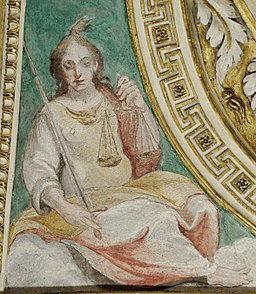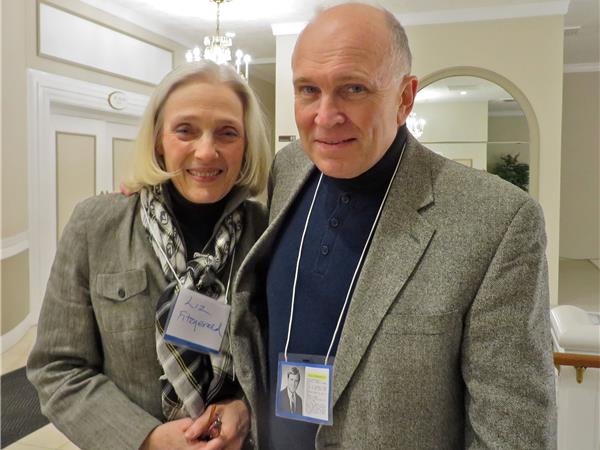The Sordid History of British Manipulation of American Democracy Series: Read it and weep!

Justice, one of the four theological virtues by Vitruvio Alberi, 1589-1590
(Image by Marie-Lan Nguyen, Author: Marie-Lan Nguyen) Details Source DMCA
"On the morning of February 14, 1979, four Afghan terrorists stopped the Ambassador's car and abducted him as he was travelling from his residence to the Embassy. By 8:50 a.m., the terrorist had taken Dubs to a second floor room in the Kabul Hotel" Despite U.S. Embassy urgings to engage in "patient negotiations," Afghan police stormed the room just after noon, and shots were fired. When U.S. Embassy officers were able to enter the room, they found the Ambassador dead from several gunshots."
The Kidnapping and death of Adolph Dubs: Official Summary
After nearly 40 years the February 14, 1979 kidnapping and assassination of U.S. Ambassador Adolph Dubs remains an enigma. At the time, Cyrus Vance's State Department and Zbigniew Brzezinski's National Security Council were deeply divided over policy toward the Soviet Union, Iran and Afghanistan. U.S. Ambassador to Afghanistan Adolph Dubs and Brzezinski held diametrically opposed objectives to the Marxist government of Nur Mohammed Taraki and Hafizullah Amin which, given the increasingly unstable political climate promoted by Brzezinski, undercut the ambassador and put him in great jeopardy. The Brzezinski/Vance divide came to a head at the Kabul Hotel that February 14; yet basic questions about the political maneuvering inside Washington that had caused the crisis for Dubs and who might have benefitted from his death have never been answered. Why did Adolph Dubs die at the Kabul Hotel, who killed him and most glaring of all, who benefitted; or as the age old term the Roman's used for assigning guilt would ask, Cui Bono?
Early reports that the four kidnappers (at least one dressed in a police uniform) were members of a Chinese-trained Tajik-Maoist splinter group of the ruling Marxist People's Democratic Party of Afghanistan (PDPA) known as the Setam-i Melli have never been confirmed but are strongly suspected. Neither are the names of the kidnappers known, nor whether it was they or the police who killed the ambassador as they stormed the room in violation (of what the US claimed) was an agreement to patiently negotiate the Ambassador's release.
No one would ever take credit for the kidnapping, the bitterly divided Afghan regime would not allow the Americans access to the evidence, the crime scene was quickly sanitized and Zbigniew Brzezinski would immediately seize upon Hafizullah Amin's refusal to accept responsibility and lack of a formal apology as proof of his pro-Soviet, anti-American bent. The kidnapping and assassination of Adolph Dubs would provide the spark to swing opinion in Washington toward Brzezinski's desire for a more aggressive destabilization of Amin's government that in turn would lead to exactly what Ambassador Adolph Dubs had died trying to prevent; a Soviet military occupation.
Two Separate events, each with different motives
The debate in Washington was over responsibility for the Ambassador's death. It focused mainly on whether it was Afghans or Soviet advisors who had ordered the assault and not on the motives of the kidnappers or the actions of the embassy and the American ambassador himself. But if Brzezinski had been correct about it affirming Amin's pro-Soviet credentials, why had the terrorists chosen an American to voice their protest and not a Soviet? Was Dubs' plan to draw Amin closer to the U.S. working? Did the kidnappers want to damage Afghanistan's relationship to the U.S. as Hafizullah Amin later claimed? Or was there another reason for leveraging the life of the American ambassador that neither the Afghans, the Soviets nor the Americans at the embassy were aware of.
As described in an interview conducted for Washingtonian Magazine in 2017 with Bruce Flatin, the political counselor dispatched by the U.S. embassy to the hotel that morning, the whole affair just didn't add up. "Why not go to some house way out in the suburbs?, he wondered. Or a safe house in the country, or a cave up in the mountains, where authorities couldn't so easily corner them? Why would Dubs' captors, whoever they were, hole up at a busy, central hotel, in a room with street-facing windows, no escape route, and not even a phone for conducting negotiations?" And most of all, "Why was Dubs the pawn in what was an Afghan problem? It didn't make sense."
And the death of the ambassador that followed made even less sense to an Afghan government struggling to find itself; unless the kidnapping of Adolph Dubs didn't start out as a kidnapping and his unfortunate death wasn't the result of a botched rescue attempt, but was a deliberate assassination intended to trap Hafizullah Amin in the role of a Soviet puppet while at the same time removing Dubs as the last remaining obstacle to an ongoing plan.
A False assumption: The "kidnapping" of Adolph Dubs
At a 1995 Nobel Symposium (pages 80-81) on the causes of the Afghan war - in the presence of former CIA director Admiral Stansfield Turner, the former Director of Soviet affairs at the National Security Council, General William Odom and dozens of former high-level U.S., Soviet and European officials - the leading Russian authority on the Soviet war in Afghanistan, the military historian General Alexander Lyakhovsky delivered testimony on the Dubs' killing which resolved part of the mystery and turned the existing narrative on its head.
"Then there was the episode where the American ambassador was killed. What were the circumstances? My account is based on my conversations with our secret services who were in charge of monitoring the crisis. One of the officers of the secret service told me that Dubs was seen in the company of those same people who kidnapped him later in the same hotel--in the same room--the day before they kidnapped him. And then later Dubs was in his car, with a travel case. He stopped his car when those same people who he saw the day before ordered him to stop, as if they were known to him. You understand that we are talking about an ambassador with an armored car, bullet--proof windows, doors that can be opened only from the inside, it has a siren that goes off in an emergency situation. Dubs did not use any of these emergency measures. He opened the door himself, let the people who kidnapped him in the car. They came to the hotel and demanded that their extremist friends, who were in prison be released. And then Amin ordered the hotel to be stormed. Both the Americans and us pleaded with Amin not to storm the hotel."
Even today, twenty seven years after the demise of the Soviet Union, most of the reports on the Dubs' assassination rely on blind speculation or resurrected anti-Soviet Cold War assumptions. But Lyakhovsky's account provides for new possibilities to explain oddities about the kidnapping that up to now couldn't be considered.
Under pressure from Brzezinski and the NSC's Thomas P. Thornton, Ambassador Dubs had been driven to meeting outside the normal channels. Dubs was known by the embassy to have allowed the police to stop and search his car despite his diplomatic immunity - presumably as a safety check before meeting secretly with Amin. Selig Harrison spoke to Bruce Flatin about it in 1989, "[T]he ambassador had talked with Amin fourteen times, often in unannounced meetings, before Dubs was killed in February 1979. No record of the content of these exchanges has yet surfaced." And they never would. According to interviews conducted by Henry S. Bradsher for his 1985 book, Afghanistan and the Soviet Union , U.S. officials back in Washington denied published reports that "Dubs had frequent lengthy discussions with Amin," while insisting that his reports "did not indicate he felt that he was making any progress toward convincing Afghan officials that they should resist Soviet influence." But as Selig Harrison makes clear in his 1995 book with Diego Cordovez, Out of Afghanistan, Dubs was careful NOT to inform Washington of his progress with Amin out of fear that in the prevailing climate which Brzezinski ruled, it would have cost him his credibility.
(Note: You can view every article as one long page if you sign up as an Advocate Member, or higher).





